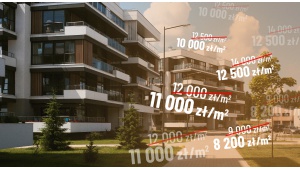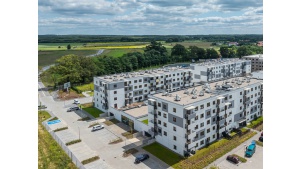What’s going on in real estate investment in CEE?
Prestige PR
Włodarzewska 81C lok 81
02-393 Warszawa
i.wisniewska|prestigepr.pl| |i.wisniewska|prestigepr.pl
508 927 958
www.prestigepr.pl
Slowdown was inevitable
The current results in the property investment market may not appear very optimistic at the moment, but this is only a temporary situation.
The COVID-19 pandemic significantly impacted the economy and customer behaviour, consequently affecting the real estate market and investors’ activity. However, buyers relatively quickly adapted to the new circumstances and the total investment volume in CEE (Czechia, Hungary, Poland, Romania, Slovakia) exceeded €10.5 billion both in 2020 and 2021.
In 2022, the outbreak of war in Ukraine further disrupted the market, leading to record-high inflation, increasing interest rates, and escalating investment uncertainty. Despite these challenges, investment volumes in CEE managed to exceed €11 billion, surpassing the two former years.
But all market players were aware, the slowdown was to hit in 2023.
Total transaction volume in the CEE region in H1 2023 (€2.2 billion) decreased by 59% (Y-O-Y). The smallest change occurred in Czechia (38% decrease with a result of €749 million) and the biggest – in Poland (72% decrease with a result of €801 million) and Hungary (82% decrease with a result of €114 million). The market freeze in Hungary is driven not only by global conditions, but also those specific to Hungary, which might be concerning for some investors - the tensions between Hungary and the EU, provider of structural funds to the country and the position of Hungary in the Ukraine-Russia conflict.
Slovakia with the volume of €321 million noted a decrease by 48%, and Romania - 44% with €180 million.
In Hungary, there are significant assets under exclusivity or under marketing, so volumes are expected to recover in the second half of the year bringing the yearly total above €500 million.
In Romania, the full year investment volume is expected to reach €600-700 million, with the retail sector being the engine of the investment market.
What’s hot and what’s not?
Retail sector
Dominance of the retail sector in the results of the whole region (35%) is mostly due to two large transactions which took place in the Czech market – divestment of Trei Real Estate from their CZ-SK supermarket and retail park portfolio to Plan B Investments for an estimated value of ca. €187 million (Czech portfolio allocation) and Pardubice Retail Fund acquisition of Palac Pardubice Shopping Center for €123 million. One of the founding companies of Pardubice Retail is Perrarus Plus, a company in the ownership of Richard Morávek, the Czech real estate investor and developer also owning Redstone Real Estate.
Despite retail transactions achieving only 18% market share in Romania (€32 million), we are expecting that this particular segment will be the investment engine in H2 which will boost the total transaction volume. In particular regional retail parks are attracting investors in Romania.
In Poland, retail volume reached €175 million, marking the lowest H1 result since 2010. After several years of unquestionable dominance by retail parks and convenience schemes, the structure of the retail investment market is undergoing a shift in 2023 as the market witnessed a return to transactions of regular shopping centres in regional cities and acquisitions for redevelopment purposes.
In Hungary retail transactions accounted for ca. 51% of the total volume but the numbers were low – only €58 million was transacted in total and it was built up of high street units, regional strip malls and smaller shopping centres.
Industrial sector
The biggest winner of the COVID-19 pandemic was hit most by the transactional slowdown of 2023. The overall result of the industrial sector in H1 in the region is mostly due to Poland’s €436 million transaction volume allocated in this segment. This result was generated in Poland by single-assets only as no portfolio deals took place and none are expected in the near future. In an effort to minimize risk investors have turned to smaller scale deals.
The largest transaction recorded on the Romanian property market in H1 2023 was the sale and leaseback of the FM logistics portfolio, with total pricing estimated at ca. €60-70 million.
No industrial transactions were recorded in Hungary and Slovakia. In Slovakia, this was partially due to investors flight to core markets, as regional Slovakia is often considered secondary by institutional funds; and partially by a lack of available product on offer in the much more liquid Bratislava Region.
Office sector
In terms of total volume, the office sector is shoulder to shoulder with the industrial sector recording a 28% market share across the CEE in H1 2023. There is a major focus on future rental growth as recent inflation levels and the consequent rental indexation have pushed many assets into “over-rented” territory.
In Poland all office deals during H1 were located in Warsaw – contrary to the trend in 2022, which favoured regional cities.
The biggest office deals in the analysed period in CEE took place in Bratislava, Slovakia - Pribinova 19 Bratislava Office was acquired by IAD Investments and Landererova 12 Bratislava Office was purchased by ZFP Investments – both deals are estimated to have a value of ca. €100 million each.
Highlights:
• € 2.2 billion - total investment volume in CEE in H1 2023 (59% decrease Y-O-Y)
• 35% - dominance of retail sector in terms of volume
• 66% - continuous dominance of CEE capital in terms of volume
Good time for investments as pricing shifts
One of the factors contributing to the decline in the number and volume of transactions in the first half of 2023 is the ongoing process of aligning price expectations between sellers and buyers. However, there are early indications that this situation may improve by the end of the year. At present, numerous buyers are seeking to capitalize on the market conditions by submitting bids significantly below historic property valuations, hoping to secure favourable deals.
But many owners are not in a hurry to sell. However, this situation will change as circumstances arise, such as the need to liquidate a fund, depletion of funding or underperformance of the property.
It is said that it is efficient to invest in times of crisis. Therefore, the current market situation is creating great investment opportunities for equity rich investors.
Some investors are positioning themselves to take advantage of the current limited liquidity (and therefore lack of competition) to acquire assets at attractive price levels in the international context. Some owners are becoming more flexible as they need to liquidate or recapitalise funds or have taken the strategic decision to exit a market. In the current situation, assets with strong fundamentals can be purchased at attractive price.
Market outlook
A key focus on investors in assessing acquisition opportunities is the ESG related future CAPEX. The required upgrade of older buildings is sometimes difficult to assess in the context of high construction costs. As buyers are almost always expecting higher deployments than sellers, the gap is often unreconcilable.
There is an abundance of opportunistic capital available for deployment, but the cost of such equity and targeted returns are so far from current sellers’ expectations that we anticipate a longer-term stalemate leading into 2024 in some markets. In markets where the re-pricing is now at play, volumes might show significant improvement in the second half of 2023.
As debt finance became more restrictive and pricier, the failure rate of transactions has dramatically increased and full equity deals are the only safe option for sellers.
While only accounting for 28% of total volume in the first semester, the industrial sector remains the darling of investors and the most sought-after segment. As in the past, the limited availability of product and ownership consolidation causes the relatively low transaction volumes.
Despite the transaction slowdown and low volumes, CEE capital remains active with a 66% share in total investment volume generated in CEE in H1 2023. Local capital is dominating in Czechia (81%), Hungary (69%) and Romania (50%).
We expect to see greater divergence in prime yields across geographies as we see a divergence of inflation rates across the region. Those countries who can reel in inflation via sensible monetary policy will win the battle against cap rate decompression.

Deweloperzy ukrywają ceny mieszkań. Z troski o klientów czy swoje portfele?

Więcej przestrzeni, mniej hałasu – dlaczego Polacy coraz częściej wybierają przedmieścia?

Jak czytać rzuty mieszkań i uniknąć przykrych niespodzianek? AI ułatwia wybór
Więcej ważnych informacji
 Jedynka Newserii
Jedynka Newserii

 Jedynka Newserii
Jedynka Newserii

Handel

Polskie MŚP otrzymają większe wsparcie w ekspansji międzynarodowej. To cel nowej inicjatywy sześciu instytucji
Firmy z sektora małych i średnich przedsiębiorstw otrzymają kompleksowe wsparcie na potrzeby zwiększania konkurencyjności na arenie międzynarodowej. Taki jest cel wspólnej inicjatywy instytucji zrzeszonych w Grupie PFR pod szyldem Team Poland. Obejmuje ona zarówno wsparcie kapitałowe, w postaci gwarancji, pożyczek czy ubezpieczenia, jak i doradztwo oraz wsparcie promocyjne i informacyjne, dzięki czemu mikro-, małym i średnim firmom łatwiej będzie podjąć decyzję o ekspansji zagranicznej. Pierwszy projekt dotyczy wsparcia dla firm zainteresowanych uczestnictwem w odbudowie Ukrainy.
Bankowość
RPP zgodna co do potrzeby obniżania stóp procentowych. Trwają dyskusje dotyczące tempa tych decyzji

W lipcu Rada Polityki Pieniężnej po raz drugi w tym roku obniżyła stopy procentowe, określając swój ruch mianem dostosowania. W kolejnych miesiącach można oczekiwać kolejnych obniżek, ale ich tempo i termin będą zależeć od efektów dotychczasowych decyzji i wzrostu płac. Docelowo główna stopa procentowa ma wynosić 3,5 proc. Te okoliczności sprzyjają kredytobiorcom.
Handel
Umowa z krajami Mercosur coraz bliżej. W. Buda: Polska nie wykorzystała swojej prezydencji do jej zablokowania

– Polska podczas prezydencji w Radzie UE nie wykorzystała szansy na obronę swoich interesów w sprawie umowy z krajami Mercosur – ocenia europoseł PiS Waldemar Buda. W jego ocenie polski rząd, mimo sprzeciwu wobec zapisów umowy, nie zbudował w UE sojuszy niezbędnych do jej odrzucenia. Porozumienie o wolnym handlu spotyka się przede wszystkim z protestami europejskich rolników, którzy obawiają się zalania wspólnego rynku tańszą żywnością z krajów Ameryki Południowej. Według europosła wszystko może się rozegrać w najbliższych tygodniach.
Partner serwisu
Szkolenia

Akademia Newserii
Akademia Newserii to projekt, w ramach którego najlepsi polscy dziennikarze biznesowi, giełdowi oraz lifestylowi, a także szkoleniowcy z wieloletnim doświadczeniem dzielą się swoją wiedzą nt. pracy z mediami.




![Część środków z Planu Społeczno-Klimatycznego trafi na walkę z ubóstwem transportowym. Organizacje branżowe apelują o zmianę priorytetowych projektów [DEPESZA]](https://www.newseria.pl/files/1097841585/rower3,w_85,_small.jpg)




.gif)

 |
| |
| |
|